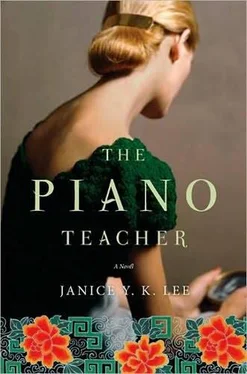“Trudy, darling. You always think of what nobody else thinks about.”
“And probably for good cause,” she says. “I’m rather an idiot about everything.”
They walk farther.
“It doesn’t feel like our town anymore, does it?”
“It’s too dreary.”
They link arms and go home, where Angeline is crying in the cellar and the amahs have made a small meal of rice and Chinese vegetables dotted with salted pork. They eat and drink weak tea, feeling the invisible constraints of the reality around them.
The next few days are Spartan and regulated, lived as if they might be the last, heightened with the surreal. They eat to sustain themselves, listen to the radio for the latest news, and go to the distribution center for supplies, which are given out sporadically and randomly. One day it’s bread and jam, another it’s bananas, and then it’s flashlights. They take what they can get and go to the black market for the rest as, between them, Trudy and Angeline have a lot of cash. At the black market in town, the atmosphere is tense, the buyers irate at the prices and shouting insults at the vendors, a few having the grace to look embarrassed behind their tables of random goods-the tins of potted meat, the small bags of sugar, the cooking utensils. The price of rice is at an all-time high, and it is as precious as gold. The ground shakes intermittently and the night is lit by fire. They see piles of dead bodies and weeping women beside them. Dominick stops by with provisions he’s got ahold of somehow, and they have the delicacy not to ask. He tells them to stay at Angeline’s for as long as possible. They have not been bothered and that is a good sign. There are a few other families holding fort at their homes as well. Will’s injury makes it impossible for him to go anywhere too far. Angeline’s driver manages to procure the newspaper most days, and the news is grim-the Japanese advancing inexorably and surprisingly fast.
“I can’t believe they still get the paper out every day,” Angeline says. She has not bathed in days and is starting to smell more than musty. She has not heard from her husband. He had last sent a message a week ago when he was fighting for the Volunteers on Mount Nicholson.
“Should we go to the Repulse Bay?” Trudy asks.
“I feel odd not doing anything,” Will says. “I feel like other men are fighting and I’m sitting around doing nothing.”
“You’re injured, you imbecile,” Trudy says. “You’d be more of a hindrance. You’re slowing me down and I’m only putting up with it because you’re a warm body to sleep next to at night. I assure you that others will not feel that way.”
The next day they wake up to find the help vanished. Trudy is entirely unsurprised.
“A clean getaway. I’m surprised the dogs haven’t deserted us.” She starts washing the dishes that were left in the basin. He rises to help her. “You sit down,” she orders. “They lasted longer than I thought. Angeline’s always been a beastly employer although she pays twice the going rate.”
“What happened to Ah Lok and Mei Sing?” Will asks, remembering them suddenly.
“I told them they should leave, and they wouldn’t, and so I locked them out of the flat until they went away. There was lots of crying and wailing-you know them. They have relatives I’m sure they’d rather be with.”
“You’re their family, Trudy.”
“But I’m not, really. And it’s more dangerous for them to be with me. They’re not going to be bothered once they’re part of the crowd out there. I’m the one who’s going to get attention, hanging about with all you foreigners.”
“It must have been very hard to make them leave,” he says, reaching for her hand.
She shakes him away.
“It’s fine, Will. Please don’t be sentimental right now. I couldn’t stand it.”
“What day is it?” he asks.
“Almost Christmas. The twentieth, I think.” She looks wistful. “The parties should be in full swing by now.” Then, “Will.”
“Trudy.”
“I’ve some things I’ve had to hide, but I want you to know where, because if something happens, you should go get them.”
“Like?”
“I’ve a lot of money that my father gave me before he went to Macau, and my jewelry too. Altogether, it’s worth a lot of money… more than enough to live on for ages.”
“I’ll take note but I don’t need it, if that’s what you’re implying. I’ll be fine with what I have.”
“And I hired a box at the bank, the main one. And I’ve your name and Dominick’s name down as people who can access it. But the thing is you have to both sign for it, unless one is dead, so you have to get along. Although I imagine things are different in wartime. There’s a key. It’s in the planter off my bedroom window in the flat. I’ve brought it inside, and it’s just filled with earth. It’s on the bottom, so you’ll have to dig it out. But if there’s no key, you can still get to it-it will just take a bit longer. Legal things, you know.”
“Noted,” he says.
“You must remember,” she says. “You really must.”
Angeline emerges from her bedroom in a dressing gown and they explain about the missing servants. She collapses into a chair.
“I don’t understand,” she says again and again. “They’ve been with me for years.” Quickly, she becomes practical. “Did they take anything?”
They hadn’t thought to look. They go to the pantry and see their fast-dwindling supplies-rice, a few potatoes and onions, flour, sugar, a few soft apples-untouched.
“Servants get a raw deal,” Will says. “They’re always the last thanked and the first accused.”
“This is survival,” Angeline says. “I’m surprised they didn’t take anything. I would have, and not had a single qualm.”
“Let’s all have a drink,” Trudy says.
“That’s the most sensible thing you’ve said all week,” Will says.
He goes to get a bottle of scotch-they are not in danger of running out of liquor anytime soon. They pour glasses, turn on the radio, and the announcer is reading a message from Churchill. “The eyes of the world are upon you. We expect you to resist to the end. The honor of the empire is in your hands.”
“We’re being abandoned,” Trudy says. “They’re not doing anything to help us. What do Churchill and the goddamned British empire expect us to do? ” Her eyes look hard and glassy but Will sees they are filmed with tears.
Every day leaflets fall from the sky, Japanese planes whirring overhead and letting loose propaganda, all over the colony, telling the Chinese and the Indians not to fight, to join with the Japanese in a “Greater Far Eastern Co-Prosperity Sphere.” They’ve been collecting them as they fall on the ground, stacking them in piles, and Trudy wakes up on Christmas Day and declares a project, to make wallpaper out of them. In their dressing gowns, they put on Christmas carols, make hot toddies, and-in a fit of wild, Yuletide indulgence-use all the flour for pancakes, and paste the leaflets on the living room wall-a grimly ironic decoration. One has a drawing of a Chinese woman sitting on the lap of a fat Englishman, and says the English have been raping your women for years, stop it now, or something to that effect, in Chinese, or so Trudy says.
“Hmmm…” she says. “Isn’t this a drawing of you and me?” She sits on his lap, puts her arms around his neck, and bats her eyes. “Please, sah, you buy drink for me?”
“It’s of me and Frederick, you idiot,” says Angeline. “Look at how fat the man is.” It’s the first time she’s mentioned her husband in days.
Another leaflet has two Orientals facing each other and shaking hands. “Japanese and Chinese are brothers. Do not struggle and join our side,” translates Angeline.
Читать дальше












